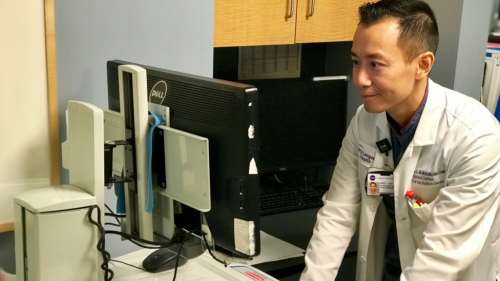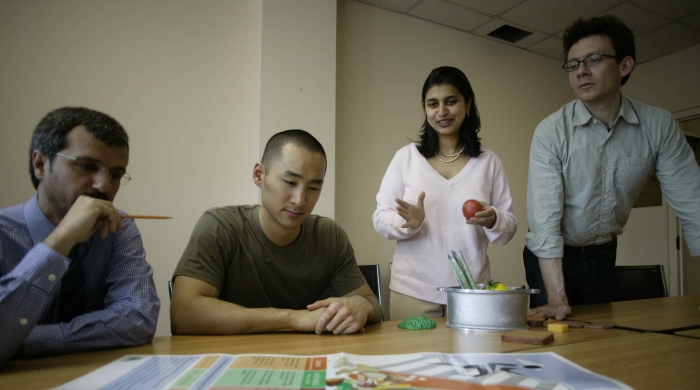
Andy Chu inputs patient data at NYU Langone Health.
Andy Chu (MS ‘10) a graduate of NYU Steinhardt’s Department of Nutrition and Food Studies, works as a registered dietitian at NYU Langone Health in the critical care center and bone marrow transplant unit. In addition to providing world-class patient care, he writes and speaks on various nutrition topics. We spoke to him about how a nutritionist provides patient care in a hospital setting.
What is a typical work day like for a dietitian at NYU Langone Health?
I start my day participating in bedside medical rounds in the critical care unit to provide individualized medical nutrition therapy recommendations to doctors and nurses. And then I participate in multidisciplinary rounds, open discussion with other healthcare disciplines – physicians, nurses, pharmacists, speech pathologists, physical and occupational therapists, care manager and social workers – to coordinate a safe care plan for our patients. I also work one-on-one with my dietary host and participate in meal rounds to see if my patients are getting the adequate amount of nutrition.
Nutrition education is a significant part of my job as well. No two patient are the same, so I provide individualized medical nutrition therapy to them based on their disease state on a daily basis.
You work with the sickest patient population at NYU Langone Health. What led you to make this choice about your practice?
When I was doing my NYU Steinhardt dietetic internship, my clinical nutrition manager noticed that I was particularly good at nutrition support in the critical care setting and communicating my findings with the rest of the healthcare team. Right after the internship, she offered me a great job opportunity. She has continued to nurture my career and recently assigned me to the critical care unit to work with NYU Langone Health’s world-renowned healing hands.
Can you talk a little about nutrition and healing? Do you have a recipe you could share with us?
Most people don’t realize this, but skin is the largest organ in the body. Despite optimal medical and nursing support, a wound will not heal without proper medical nutrition therapy. Nutrition plays a key role in both the prevention and treatment of wounds.
This is my wound healing, anti-inflammatory fruit smoothie. Regarding the ice cream ingredient in the smoothie recipe, to save calories, you can substitute plain or vanilla Greek yogurt. (The caloric requirement for wound healing is higher than that of a normal healthy person.)
High Protein Fruit Smoothie Recipe
1 cup whole milk
½ cup vanilla ice cream
1 small banana
2 ounces strawberries and blueberries
1 packet whey protein powder
Place all of the ingredients in a blender and blend until the mixture has the consistency of a smoothie. Feel free to substitute plain or vanilla Greek yogurt for the ice cream.
We’ve talked about your clinical work. Can you share some of your recent academic accomplishments?
I have co-authored several wound care and nutrition-related research and review articles in peer-reviewed journals with some of my mentors and colleagues. I was invited to be a speaker at wound care symposiums to help clinicians to understand the importance of nutrition as prevention and treatment of wounds. I’ve been certified and re-certified as a Certified Nutrition Support Clinician (CNSC) and designated as a Fellow of the Academy of Nutrition and Dietetics (FAND) during my time at NYU Langone Health. I’m also part of the editorial advisory board of a peer-reviewed journal called Advances in Skin and Wound Care.
What was the best part of your education at NYU Steinhardt?
Research is the building block of evidence-based practice. When I was a student in the master's program in the Department of Nutrition and Food Studies, I had the opportunity to be part of a nutrition research project undertaken in coordination with the New York City Department of Health and Mental Hygiene. As part of a baseline study before the new calorie labeling regulation went into effect, we surveyed New Yorkers about their food consumption patterns. Working on this with Domingo Piñero gave me first-hand exposure to the experience of conducting research in the nutrition field, which further nurtured my ambition to write my own articles.
I also had the great opportunity of learning from the world-renowned faculty members at NYU Steinhardt – from Lisa Sasson to Marion Nestle, they are all my career inspirations.

